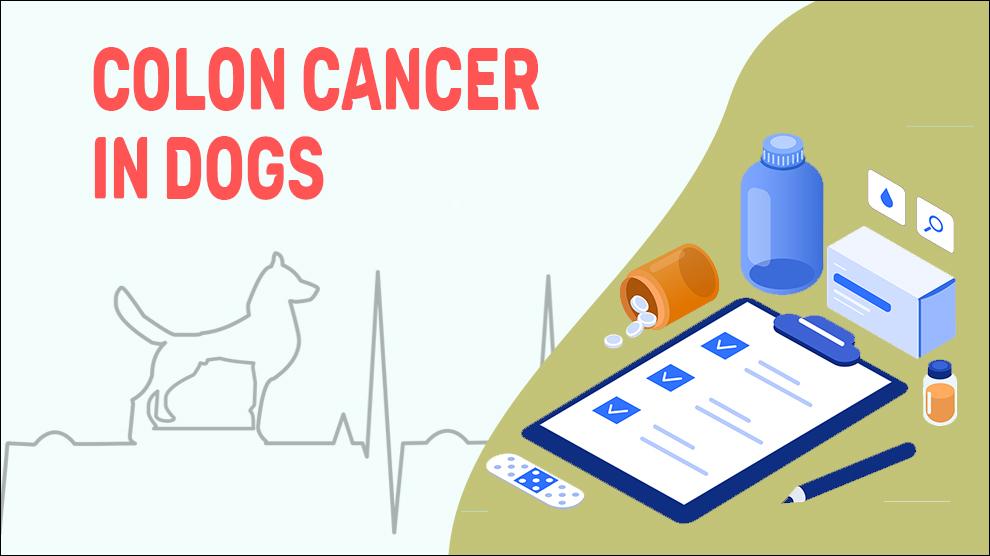Cancers that originate in the large intestine (colon) are called colon cancers. The colon is the terminal portion of the intestinal tract located between the ileum (small intestine) and the rectum.
The canine large intestine is 1.2 - 1.5 feet in length in a forty-pound dog. The large intestine is compartmentalized into the caecum, colon, rectum, anal canal, and anus. The colon is further divided into ascending, transverse, and descending colons, each section has somewhat different properties and functions.
The primary function of the colon is to absorb water from feces and maintain fluid and electrolyte (salt) balance thus keeping the body’s hydration level steady. Its other function is to store fecal matter temporarily awaiting passage to the rectum for elimination.
Colon and rectal cancers are usually grouped under ‘colorectal cancer’ as they both have many features in common. Proximal colon cancer and Colorectal tumors are the most common tumors of the large intestine.
Colon cancer has no sex disposition and occurs in both males as well as females. This cancer tends to be locally invasive in the surrounding tissues and has a high rate of metastasis (spread to distant tissues).
Symptoms Of Colon Cancer
General Symptoms of tumors in the colon region may include:
- Constipation, Obstipation, Dyschezia, Tenesmus.
- Ascites (fluid build-up in the stomach).
- Narrow or ribbon-like Stools or bloody / black / tarry stools.
- Inflammation of external swelling in the perianal region.
- Polyuria, Polydipsia
Dog owners may also observe symptoms of elevated calcium levels (paraneoplastic syndrome).
These symptoms generally include:
- Increased thirst and urination may occur.
- Vomiting
- Lethargy
- Anorexia
- Muscle weakness
Treatment Options For Colon Cancer
- Surgical options, radiation, chemotherapy, or a combination of these modalities may be tried.
- Colonoscopy (polypectomy) is used to remove polyps.
- Endoscopic mucosal resection - for larger polyps.
- Partial Colectomy - Part of your colon that contains the cancer is removed.
- For advanced cancers, surgery is the only option followed by chemotherapy.
- Radiotherapy may be used to shrink cancerous cells prior to surgery or used post-op to reduce the duration of the resulting remission.
- Newer treatment protocols such as immunotherapy, Targeted drug therapy, and monoclonal antibodies are also available.
Home Remedies For Colon Cancer
- After surgery, Dog activities should be restricted activity for about 2 weeks to allow recovery and incision healing.
- A restrictive collar usage is recommended for 10 - 14 days. This prevents the natural tendency of dogs to lick and chew at a wound.
- A diet of roughly 50% meat and 40 - 50% whole grains or non-starchy vegetables is optimal.
- A homemade balanced diet is an alternative to commercial diets.
- Fish oils or fish meals, or whole fish are rich in omega-3 fatty acids.
Prevention Of Colon Cancer
When dogs are diagnosed with inherited types of colorectal cancer, it is important to take measures to avoid breeding or neutering the dogs (if they do survive to adulthood) to remove affected dogs from the gene pool.
Affected Breeds Of Colon Cancer
Cavalier King Charles Spaniel, Boxer, German Shepherd, Poodle, Great Dane, Spaniel Dog Breeds, Middle Age Dogs, Senior Dogs, Samoyed, Fox Terrier, Siberian Husky
Additional Facts For Colon Cancer
- Causes:
- Hereditary
- Overweight dogs
- Colon infection
- Presence of colorectal polyps.
- Irritation from constant diarrhea.
- Entamoeba histolytica infection.
- Inflammatory bowel disease (IBD).
- Types:
Primary Colon Cancer: Cancer that originates in the colorectal region itself is called primary prostate cancer. Most primary colon cancers are destructive and with high metastatic potential. For example, colorectal Adenocarcinomas (95 %).
Secondary Colon Cancer: Cancer that spreads from another organ or metastasized to the colorectal region.
- Mortality:
The mortality rate of benign types of colon cancer is almost zero. Colorectal Adenocarcinoma is highly aggressive and it should be diagnosed early as well as treated promptly. Sadly less than 50% of dogs live more than 10 - 12 months from the time of diagnosis of malignant colorectal tumors.
- Diagnosis:
- Complete blood count (CBC), Blood chemistry profile
- Electrolyte panel
- Urinalysis / Faecal analysis
- Guaiac-based fecal occult blood test (gFOBT).
- Gut Biopsies: Include mucosal biopsies of the stomach, duodenum, and/or ileal mucosa (ileoscopy).
- Prognosis:
Prognosis can differ based on the time of diagnosis and aggressiveness of the tumor. When the cancer is detected early, before any metastasis, radiation and chemotherapy treatment may be effective. When there is the presence of significant metastasis, vets may recommend against conventional treatment and will treat your dog’s clinical signs to make them comfortable.
When To See A Vet
Contact your vet right away, if you notice any of the following:
- Ascites (fluid build-up in the stomach).
- Narrow or ribbon-like Stools or bloody/black/ tarry stools.
- Inflammation of external swelling in the perianal region.
Food Suggestions For Colon Cancer
- Diet high in protein, fat, and complex carbs.
- Protein: High protein diet comprising 40% of the dog's calories. Fresh, lean protein (Lean ground beef, White-meat skinless chicken, or turkey).
- Fats: Omega-3 and other healthy fats.
- Complex Carbohydrates: Fibers and starches (Whole Grains, Oatmeal, Brown Rice, Potatoes & Sweet Potatoes).
- Overweight dogs - Lower calorie diets, for underweight dogs- Higher calorie diets.
- Vitamin-rich fruits and veggies: Legumes, such as lentils, peas or beans, cauliflower, cabbage, broccoli, tomatoes, and citruses, such as oranges and limes.
Conclusion
The most favorable prognosis can be expected with early detection and appropriate treatment. This emphasizes the significance of a stomach examination as part of a routine physical examination in all dogs.
For benign tumors, recovery is very good. Proper post-operative care should be provided for 3 months to monitor tumor regression. Malignant colon tumors recovery is poor. Many dogs can die within a year from diagnosis, or sometimes be euthanized.

















